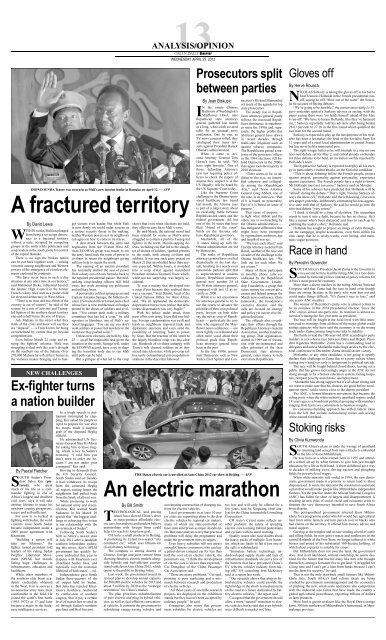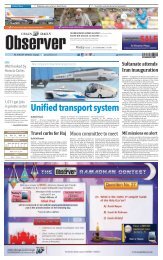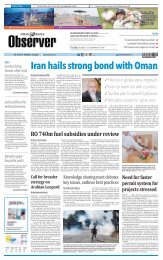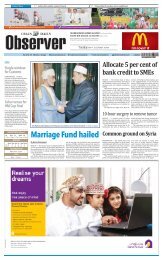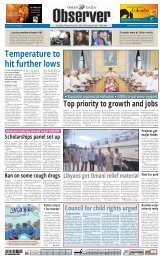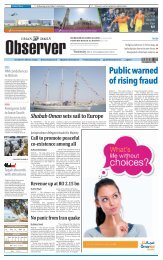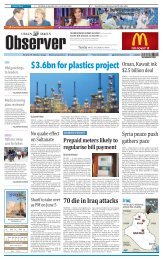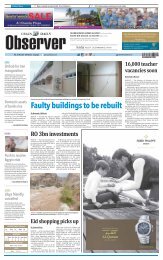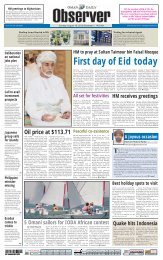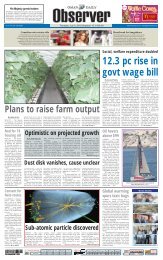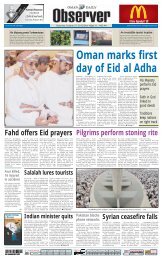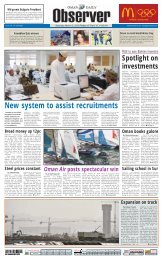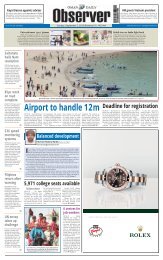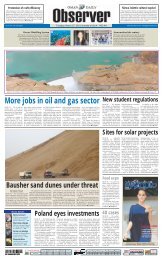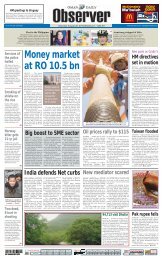Observer 25 Apr 2012 - Oman Daily Observer
Observer 25 Apr 2012 - Oman Daily Observer
Observer 25 Apr 2012 - Oman Daily Observer
Create successful ePaper yourself
Turn your PDF publications into a flip-book with our unique Google optimized e-Paper software.
DIONCOUNDA Traore was sworn in as Mali’s new interim leader in Bamako on <strong>Apr</strong>il 12. — AFP<br />
A fractured territory<br />
By David Lewis<br />
WITHIN weeks, Mali has plunged<br />
from being a sovereign democracy<br />
to a fractured territory<br />
without a state, occupied by competing<br />
groups in the north while politicians and<br />
coup leaders in the south jostle for control<br />
of the capital Bamako.<br />
There is no sign the broken nation<br />
can be put back together soon — raising<br />
concerns among neighbours and Western<br />
powers of the emergence of a lawless elements<br />
exploited by criminals.<br />
“We have never been in such a dire<br />
situation at any other time in our history,”<br />
said Mahmoud Dicko, inuential head of<br />
the Islamic High Council in the former<br />
French colony once seen as a poster child<br />
for electoral democracy in West Africa.<br />
“There is no state and two-thirds of the<br />
country is out of control,” he said of the<br />
seizure by a mix of activists and Tuaregled<br />
ghters of the northern desert territory<br />
one-and-a-half-times the size of France.<br />
Ask Malians in the street what they<br />
think of the crisis and most will say they<br />
are “depassé” — a French term for being<br />
overwhelmed by events that go beyond<br />
comprehension.<br />
Even before March 22 coup and ensuing<br />
the ghters’ advance, Mali was<br />
struggling to deal with this year’s drought<br />
on the southern rim of the Sahara. Over<br />
270,000 Malians have ed their homes as<br />
the violence makes bringing aid to hun-<br />
NEW CHALLENGES<br />
Ex-fighter turns<br />
a nation builder<br />
By Pascal Fletcher<br />
SOUTH Sudan’s President<br />
Salva Kiir (pictured),<br />
who spent<br />
much of his life as a commander<br />
ghting in one of<br />
Africa’s longest and deadliest<br />
civil wars, says it will take<br />
another lifetime to make his<br />
newborn country prosperous,<br />
secure and self-sufcient.<br />
For now it is locked in<br />
ghting with Sudan, the worst<br />
violence since South Sudan<br />
became independent under a<br />
2005 peace agreement with<br />
Khartoum.<br />
“Building a nation will<br />
take our lifetimes,” the<br />
ghter turned president told<br />
leaders of his ruling Sudan<br />
Peoples’ Liberation Movement<br />
(SPLM) last month,<br />
listing huge challenges in<br />
infrastructure, education and<br />
healthcare.<br />
While other members of<br />
the southern elite boast academic<br />
credentials obtained<br />
in the West, Kiir is seen as a<br />
no-nonsense army man, most<br />
comfortable in the eld. He<br />
joined the south’s rst battle<br />
(1955-1972) at 17 and later<br />
became a major in the Sudanese<br />
intelligence services.<br />
ger victims even harder. But while Mali<br />
is now rmly on world radar screens as<br />
a serious security threat in the making,<br />
neither Western powers nor its neighbours<br />
can agree on how to come to its rescue.<br />
A deal struck between the junta and<br />
negotiators from the 15-state West African<br />
ECOWAS group was meant to see<br />
the army hand back the reins of power to<br />
civilians in return for neighbours giving<br />
military help to regain the north.<br />
The naming of an interim president<br />
has nominally shifted the seat of power<br />
from a dusty out-of-town barracks back to<br />
the repaired presidential palace. But midranking<br />
coup-leading ofcers still hold<br />
sway, last week arresting top politicians<br />
and military brass.<br />
A personality cult has sprung up around<br />
Captain Amadou Sanogo, the hitherto obscure<br />
US-trained ofcer turned junta chief<br />
whose face is now emblazoned on badges<br />
pinned to the chests of soldiers and civilians.<br />
“You cannot push aside a military<br />
committee that has led a coup,” he told<br />
reporters in Bambara, one of Mali’s national<br />
languages. “You can say you don’t<br />
want soldiers in power but nowhere in the<br />
world are they pushed aside.”<br />
Unless new elections are held by May<br />
23 — an all but impossible task given the<br />
situation in the north, Sanogo will, under<br />
the ECOWAS accord, have a say in shaping<br />
the transition body due to run Mali<br />
until polls can be held.<br />
But a glimpse at what led to the coup<br />
In a tough speech to parliament<br />
interrupted by clapping,<br />
Kiir asked his people in<br />
<strong>Apr</strong>il to prepare for war after<br />
his troops made a surprise<br />
grab of the disputed Heglig<br />
oileld.<br />
He admonished UN Secretary-General<br />
Ban Ki-Moon<br />
for asking him to leave Heglig,<br />
which is key to Sudan’s<br />
economy. “I told him you<br />
don’t need to order me because<br />
I am not under your<br />
command,” Kiir said.<br />
Bowing to demands from<br />
the UN Security Council,<br />
South Sudan said on Sunday<br />
it had withdrawn its troops<br />
from the contested Heglig<br />
oil region, raising hopes the<br />
neighbours had pulled back<br />
from the brink of all-out war.<br />
While promising to work<br />
for national unity and reconciliation,<br />
Kiir warned South<br />
Sudanese in his March 26<br />
speech that “the biggest challenge<br />
to achieving this vision<br />
is our relationship with the<br />
government of Sudan”.<br />
Following South Sudan’s<br />
birth as Africa’s newest state<br />
in July 2011 after a landslide<br />
southern referendum endorsing<br />
this move, Kiir’s SPLM<br />
government has quickly become<br />
embroiled this year in<br />
disputes with Khartoum over<br />
ill-dened border lines, and<br />
especially over the economic<br />
lifeblood of both states — oil.<br />
Independence gave South<br />
Sudan three-quarters of the<br />
oil output held by Sudan.<br />
But Juba has rejected Khartoum’s<br />
insistence, reinforced<br />
by conscation of southern<br />
cargoes, that it pay a certain<br />
level of transit fees to send its<br />
oil through Sudan’s northern<br />
pipelines and Red Sea port.<br />
13<br />
ANALYSIS/OPINION<br />
OMAN DAILY <strong>Observer</strong><br />
shows that even when elections are held,<br />
they offer no easy x to Mali’s woes.<br />
By mid-March, the national mood had<br />
been strained for weeks as Mali’s army<br />
struggled to contain a push by Tuareg-led<br />
ghters in the north. Morale-sapping defeats,<br />
including one that led to the slaughter<br />
of dozens of soldiers, sparked protests<br />
in the south, both among civilians and<br />
soldiers. It was one such army protest on<br />
March 21 that snowballed faster than anyone<br />
expected. Within hours, it morphed<br />
into a coup d’etat against incumbent<br />
President Amadou Toumani Toure which,<br />
while not too surprising, was largely accidental.<br />
“It was a mutiny that developed into<br />
a coup d’etat because they realised there<br />
was a vacuum,” Said Djinnit, head of the<br />
United Nations Ofce for West Africa,<br />
said. “We all applauded the democratic<br />
dispensation but we now realise that democratic<br />
dispensation was very fragile.”<br />
With his palace under attack from<br />
parts of his own army, Toure ed into hiding.<br />
Foreign condemnation was swift and<br />
harsh as neighbours imposed trade and<br />
diplomatic sanctions and even aired the<br />
possibility of returning Toure to power<br />
by force. But the reaction of the street to<br />
the largely bloodless coup was less clear<br />
cut. Hundreds of civilians unhappy with<br />
Toure’s rule cheered soldiers on as they<br />
seized state television, while pro-coup rallies<br />
easily outnumbered anti-coup demonstrations<br />
in the days that followed.<br />
WEDNESDAY, APRIL <strong>25</strong>, <strong>2012</strong><br />
Prosecutors split<br />
between parties<br />
By Joan Biskupic<br />
IN the ornate Chinese<br />
Ballroom of Washington’s<br />
Mayower Hotel, nine<br />
Republican state attorneys<br />
general gathered last month<br />
at a long, white-cloth covered<br />
table for an unusual news<br />
conference. One by one, as<br />
TV news cameras rolled, they<br />
catalogued their many lawsuits<br />
against President Barack<br />
Obama’s administration.<br />
When it came to Arizona<br />
Attorney General Tom<br />
Horne’s turn, he said, “We<br />
have eight lawsuits.” One of<br />
those, defending Arizona’s<br />
new law requiring police of-<br />
cers to check the papers of<br />
anyone they suspect is in the<br />
US illegally, will be heard by<br />
the US Supreme Court today.<br />
Like the Supreme Court<br />
challenge to the Obama-sponsored<br />
healthcare law heard<br />
last month, the Arizona case<br />
is part of a larger story about<br />
an escalating battle between<br />
Republican-led states and the<br />
federal government. All but<br />
one of the 16 states that have<br />
led “friend of the court”<br />
briefs on the Arizona side<br />
have Republican governors.<br />
Meanwhile, all of the<br />
11 states lining up with the<br />
Obama administration are led<br />
by Democrats.<br />
The ranks of Republican<br />
attorneys general have swelled<br />
dramatically in the last decade,<br />
resulting in a nearly even<br />
nationwide partisan split that<br />
is unprecedented in modern<br />
history. Republican attorneys<br />
general now number 24 of<br />
the 50 state attorneys general,<br />
compared with just 12 as recently<br />
as 2000.<br />
While it is not uncommon<br />
for attorneys general to try to<br />
use the courts to advance the<br />
priorities of their own political<br />
party, lawyers on both sides<br />
say the newer crop of Republicans<br />
— particularly the core<br />
nine who organised the May-<br />
ower news conference — are<br />
more tightly co-ordinated and<br />
often more vocal about their<br />
political goals than Republican<br />
attorneys general have<br />
been in the past.<br />
In the late 1990s, prominent<br />
Democrats such as New<br />
York’s Eliot Spitzer and Con-<br />
necticut’s Richard Blumenthal<br />
set much of the agenda for top<br />
state prosecutors.<br />
The steady rise in Republican<br />
attorneys general partly<br />
follows the increased Republican<br />
dominance in statehouses<br />
since the 1990s and, separately,<br />
the higher prole that<br />
attorneys general have drawn<br />
in recent decades through<br />
multi-state litigation such as<br />
against tobacco companies.<br />
The Republicans gained a majority<br />
of the governors’ ofces<br />
in the 1994 elections, fell behind<br />
Democrats in the 2000s,<br />
then again took the majority in<br />
2010 elections.<br />
“There seems to be, in addition<br />
to the size, an intensi-<br />
ed cohesion and collegiality<br />
among the (Republican)<br />
AGs,” said Texas Attorney<br />
General Greg Abbott, one of<br />
the nine, in an interview. “Part<br />
of it is based on personality.<br />
Part of it is based on sense of<br />
purpose.”<br />
That sense of purpose —<br />
to ght what Abbott and the<br />
others say is overreaching by<br />
the Obama administration —<br />
has mitigated differences that<br />
might have been prompted<br />
by regionalism, ambition, age<br />
and length of service.<br />
“We trust each other,” said<br />
Florida Attorney General Pam<br />
Bondi, another of the nine and<br />
a leader of the challenge to the<br />
Obama healthcare law. “We<br />
look out for each other. We<br />
are a team.”<br />
Many of them participate<br />
in monthly phone calls coordinated<br />
by the Republican<br />
State Government Leadership<br />
Foundation, a group that<br />
raises money for conservative<br />
causes and helped arrange the<br />
March news conference. Chris<br />
Jankowski, the foundation’s<br />
executive director, said the<br />
calls are focused on strategy<br />
and policy yet can involve litigation<br />
decisions.<br />
The ofcials also co-ordinate<br />
their efforts through the<br />
Republican Attorneys General<br />
Association, another fundraising<br />
group. That organisation,<br />
started in 1999 out of frustration<br />
with environmental and<br />
other priorities of the then<br />
Democratic state attorneys<br />
general, raises money to help<br />
elect more Republicans.<br />
THE Denza electric car is unveiled at Auto China <strong>2012</strong> car show in Beijing. — AFP<br />
An electric marathon<br />
By Bill Smith<br />
TECHNOLOGICAL and pricing<br />
issues have slowed China’s drive<br />
to mass-produce affordable electric<br />
cars, but analysts and insiders believe<br />
partnerships with foreign rms could<br />
help it to reach its long-term goal.<br />
CH Auto, a small producer in Beijing,<br />
is promoting its Cylent two-seater “city<br />
commuter car,” which uses lithium-ion<br />
(li-on) battery technology.<br />
The company is among dozens of<br />
Chinese, foreign and joint-venture rms<br />
showing futuristic electric models alongside<br />
hybrids and fuel-efcient conventional<br />
vehicles at Auto China <strong>2012</strong>, which<br />
opens to the public in Beijing today.<br />
Last week, the government issued its<br />
revised plan to develop annual capacity<br />
for 500,000 electric vehicles by 2015 and<br />
about 5 million by 2020 as the “strategic<br />
orientation” for China’s market.<br />
The plan prioritises industrialisation<br />
of pure electric and plug-in hybrid vehicles,<br />
as well as fuel-efcient conventional<br />
vehicles. It commits the government to<br />
subsidising energy-saving vehicles and<br />
accelerating construction of charging stations<br />
for electric vehicles.<br />
Local governments in at least 10 major<br />
cities are supporting plans to develop<br />
electric vehicles by regional car makers,<br />
many of which are state-controlled or<br />
have state enterprises as major shareholders.<br />
But some analysts worry that practical<br />
problems will delay the programme and<br />
make the government miss its targets.<br />
Even heavy subsidies will not attract<br />
enough Chinese consumers, who can buy<br />
a petrol-driven compact car for less than<br />
half the cost of an electric vehicle, the<br />
pessimists say. “I think the development<br />
of electric cars is slower than expected,”<br />
Cui Dongshui of the China Passenger<br />
Car Association said.<br />
“There are many problems,” Cui said,<br />
pointing to poor marketing and a mismatch<br />
between research and production<br />
of electric vehicles.<br />
“All those years of scientic research<br />
projects are displayed on the exhibition<br />
stands but they haven’t been accepted by<br />
ordinary people,” he said.<br />
Companies also worry that government<br />
subsidies for electric vehicles are<br />
too low and will only be offered for a<br />
few years, said Jia Xinguang, chief analyst<br />
for the China Automobile Consulting<br />
Corporation.<br />
CH Auto’s Cylent name reects another<br />
problem: the safety of speeding<br />
electric cars looming behind pedestrians<br />
and cyclists with no aural warning.<br />
Quality issues also raise doubts about<br />
the heavy packs of multiple li-on batteries,<br />
which are likely to fail if just one of<br />
the cells is substandard.<br />
“Immature battery technology, underdeveloped<br />
supply chains and lack of<br />
infrastructure standards are just a few of<br />
the barriers that have prevented China’s<br />
EV (electric vehicle) industry from taking<br />
off,” US consulting rm McKinsey<br />
said in a report last week.<br />
“Our research shows that plug-in hybrid-electric<br />
vehicles could provide the<br />
right bridge in the short- to medium-term<br />
on the road to a future dominated by battery-electric<br />
vehicles,” the report said.<br />
Cui agreed that the government should<br />
allow a more “natural” transition to electric<br />
vehicles, but he said that even hybrids<br />
were difcult to market in China.<br />
Gloves off<br />
By Herve Rouach<br />
NICOLAS Sarkozy is taking the gloves off in his bid to<br />
beat Francois Hollande in the French presidential runoff,<br />
saying he will “blow out of the water” the Socialist<br />
he accuses of eeing debates.<br />
“We’re going to be horrible,” the conservative daily Le Figaro<br />
yesterday quoted a Sarkozy adviser as saying, with the<br />
paper saying there were “no holds barred” ahead of the May<br />
6 run-off. “We have to harass Hollande, like they’ve harassed<br />
me,” Sarkozy reportedly told his advisers after being beaten<br />
28.63 per cent to 27.18 in the rst round which qualied the<br />
two men for the second round.<br />
Sarkozy is expected to play up the inexperience of his rival,<br />
who has been a lawmaker, the head of the Socialist Party for<br />
11 years and of a rural local administration in central France<br />
but has never held a ministerial post.<br />
The right-winger believes he will triumph in a one-on-one<br />
televised debate set for May 2, and called already on Sunday<br />
for three debates to be held, an invitation swiftly rejected by<br />
Hollande’s team.<br />
The hyperactive Sarkozy is expected to deploy all his energy<br />
in particularly virulent attacks on the Socialist candidate.<br />
“This is about debating before the French people, project<br />
against project, personality against personality, experience<br />
against experience. The French people have a right to know,<br />
Mr Hollande must not run away,” Sarkozy said on Monday.<br />
Some of his advisers have predicted that Hollande will be<br />
“afraid” during the debate. “That’s right, Nicolas Sarkozy always<br />
the show-off,” Hollande told the left-leaning Liberation<br />
newspaper yesterday, deliberately contrasting his less-aggressive<br />
tone with that of Sarkozy. He said he would go into the<br />
televised debate “very serene”.<br />
“I think it should be a time of elevation. The incumbent<br />
wants to turn it into a ght, because he has no choice. He’s<br />
like a runner who’s been distanced and tries to catch up by<br />
grabbing the leader’s shirt,” Hollande said.<br />
Hollande has sought to project an image of calm throughout<br />
the campaign, despite accusations, even from within his<br />
own camp, that he is wishy-washy, even boring, and maintains<br />
vague positions.<br />
Race in hand<br />
By Peroshni Govender<br />
SOUTH Africa’s President Jacob Zuma is the favourite to<br />
win a second term to lead the ruling ANC in a race dominated<br />
by factional politics instead of policy reforms for<br />
Africa’s most powerful economy.<br />
More than a dozen insiders in the ruling African National<br />
Congress said that Zuma had the race in hand even though<br />
there are strong factions in the party who want him out and<br />
could make things difcult. “It’s Zuma’s race to lose,” said<br />
one senior ANC member.<br />
The winner of December’s party vote is almost certain to<br />
be its nominee in the 2014 presidential election. Since the<br />
ANC enjoys virtual one-party rule, its nominee is almost assured<br />
of winning the ve year term as president.<br />
The race will be fought at the local level with little attention<br />
paid to warnings from all three of the major global credit<br />
ratings agencies who have said the economy is on the wrong<br />
track under Zuma, posing long-term risks to stability.<br />
The battle to lead the 100-year-old ANC according to party<br />
insiders is a two-horse race between Zuma and Deputy President<br />
Kgalema Motlanthe. Zuma has a commanding lead in<br />
delegates and unless Motlanthe make huge strides by the electoral<br />
conference in December, Zuma should secure victory.<br />
Motlanthe, or any other candidate, is not going to openly<br />
declare their challenge to Zuma due to a party culture where<br />
raising one’s hand too early is tantamount to political suicide.<br />
The race will be fought behind closed doors, leaving out a<br />
public that has grown increasingly angry at the ANC for not<br />
doing enough to x a broken education system, failing hospitals,<br />
rampant poverty and chronic unemployment.<br />
“Motlanthe has strong support but it’s all about timing and<br />
we want to make sure that his chances are good before nominations<br />
open,” said a source close to the deputy president.<br />
The ANC, a former liberation movement that became the<br />
ruling party when the white-minority apartheid regime ended<br />
18 years ago, is a broad-tent political grouping with members<br />
ranging from hard core communists to business moguls.<br />
Its consensus-building approach has stied radical ideas<br />
from the left that include nationalising mines and seizing<br />
white-owned farmland.<br />
Stoking risks<br />
By Olivia Kumwenda<br />
SOUTH Africa’s plans to undo the wrongs of apartheid<br />
by returning land seized from native blacks is embodied<br />
in the life of Koos Mthimkhulu.<br />
He was born on a white-owned farm in 1955 and attended<br />
a school set up by white farmers to give him just enough<br />
education for a life as eld hand. A short childhood gave way<br />
to decades of milking cows, driving tractors and ploughing<br />
elds for poverty-level wages.<br />
When white-minority rule ended in 1994, the new democratic<br />
government made it a priority to return land to those<br />
dispossessed. It wrote the idea into the constitution and made<br />
a plan that would make people like Mthimkhulu independent<br />
farmers. Yet the practice under the African National Congress<br />
(ANC) has fallen far short of targets and disappointment is<br />
stocking up new risks of social, racial and economic crisis to<br />
threaten the very democracy intended to save South Africa<br />
from disaster.<br />
The post-apartheid government selected Koos Mthimkhulu<br />
for a programme under which it would buy agricultural<br />
land from white farmers and turn parcels over to blacks who<br />
had claims on the territory. It offered him money, advice and<br />
moral support.<br />
Greying at the temples and at ease tending a herd of cattle<br />
and tilling elds, he now grows maize and sunowers in the<br />
central atlands of the Free State, no longer tethered to white<br />
bosses and proud of his substantial 500-hectare holding, of<br />
which about a quarter is suitable for crops.<br />
But Mthimkhulu does not own the land, the government<br />
does. And in all likelihood, without ownership, he seems destined<br />
for the failure that has hit many like him who thought<br />
themselves among a fortunate few to get land: “I struggled for<br />
a long time and I can’t get a loan from banks because I can’t<br />
use the farm for security,” he said.<br />
That is not the only drawback small farmers like Mthimkhulu<br />
face; South Africa’s land reform ideals are being<br />
crushed by government mismanagement and the economics<br />
of pitching the new, small-scale operations into competition<br />
with the industrial-size farms that have made the country a<br />
global agricultural powerhouse, exporting billions of dollars<br />
in farm products.<br />
Most food is grown at places like the Royal Dawn orange<br />
farm, 300 km northeast of Mthimkhulu’s homestead, in Mpumalanga<br />
province.


